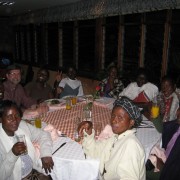 Of course I do not know exactly what Jesus would say if asked about 9/11, but I know what He said about a tragedy that happened during His time on earth.
Of course I do not know exactly what Jesus would say if asked about 9/11, but I know what He said about a tragedy that happened during His time on earth.
A tower had fallen in an area of Jerusalem called Siloam and had killed 18 people. There is hardly any numerical comparison between 18 and the thousands who perished in the attack on the NYC twin towers, but it was a tragedy in that day. Perhaps because some folks had raised the question with Jesus, or just because He wanted to teach His perspective, He posed, “do you think that they were worse sinners than all other men who dwelt in Jerusalem?”
I don’t think anyone today would ask whether or not the thousands who went to work in the World Trade Center, the Pentagon, or flew on the fated airplanes on 9/11 were worse sinners than others. They were industrious, hard-working people going about their business. So the ancient tower and the 9/11 disasters were different in that the former was an accident while the latter were intentional acts of destruction.
Still, it is important to hear what Jesus said and consider its impact for us today. Here is what Jesus said:
“I tell you, no; but unless you repent you will all likewise perish” (Luke 13:5).
A part of me says OUCH! How could a man who preached love say such a cruel thing? But, all things considered, Jesus was helping us interpret tragedies wisely. There is no way to bring back the dead. The Bible says, “And as it is appointed for men to die once, but after this the judgment” (Hebrews 9:27). Death will arrive for each of us, after which we will face God.
So Jesus’ statement turns our focus away from questioning whether or not the dead were more deserving of their untimely demise. Instead, says Jesus, focus on how you are living while you are still living. You still have a chance to live meaningfully, for the good of others.
I have heard it said that no one ever came to the end of their life and wished they had spent LESS time with their family and loved ones. I think Jesus would encourage us to learn from 9/11 by committing to invest more time on the things that matter, with the people who matter. Reflect on the unpredictable nature of life. Accidents happen. Life is fragile. A tower could fall on you tomorrow, a car could run off the road at hit you, or your heart could stop suddenly.
Perhaps Jesus would also encourage us to put our problems in perspective. The financial strains we have may be serious, but at least we still have the gift of life. We may have a terrible illness, but we aren’t dead just yet. We may be unemployed or stressed out by our work situation, but at least there is hope of improvement. We can look at tragedy and be thankful that so many are spared. Frankly, the 9/11 remembrances I’ve seen are filled with hope and thankfulness. I think Jesus would applaud that.
But of course Jesus is speaking quite frankly and we would be cheating His words if we danced around them with niceties. Fact is, He said that we too will meet with a terrible tragedy (“perish”) unless we “repent.” Let’s unpack this statement briefly.
You know, Jesus’ whole life was to bring us some really GOOD NEWS. But the thing that makes His news so good is that without His intervention there is some horribly BAD NEWS. Don’t tune me out just yet….  Jesus explained the situation this way:
“For God so loved the world that He gave His only begotten Son, that whoever believes in Him should not perish but have everlasting life” (John 3:16).
Do you see the word “perish” there? The harsh reality Jesus wants to share is that apart from Him we will perish, separated forever from God in hell. That’s really bad news.
That’s why He came, and that’s what we need to focus on as we remember the 9/11 tragedy. We need to be sure that we repent, i.e. change our minds about ourselves and about God. Instead of hoping we have been good enough to win God’s approval, we place our faith (i.e. believe) in the payment Jesus made for our sins on the cross. Instead of going with the majority and trying our best to be good, we take the hard path and surrender our will to Jesus, accepting His gracious gift of forgiveness and eternal life. That is repentance that leads to everlasting life in heaven.
I believe Jesus today weeps at the terrible loss of life suffered on 9/11. I know He has drawn near to many people who grieved so deeply. And based on God’s Word, I am quite confident Jesus wants us to remember both the victims, the families and the heroic efforts of those days. And most of all, Jesus would want each of us today to place ourselves into His hands, that we might experience the confidence that, no matter what happens to us in this life, we will spend our eternal life safe in His care.



